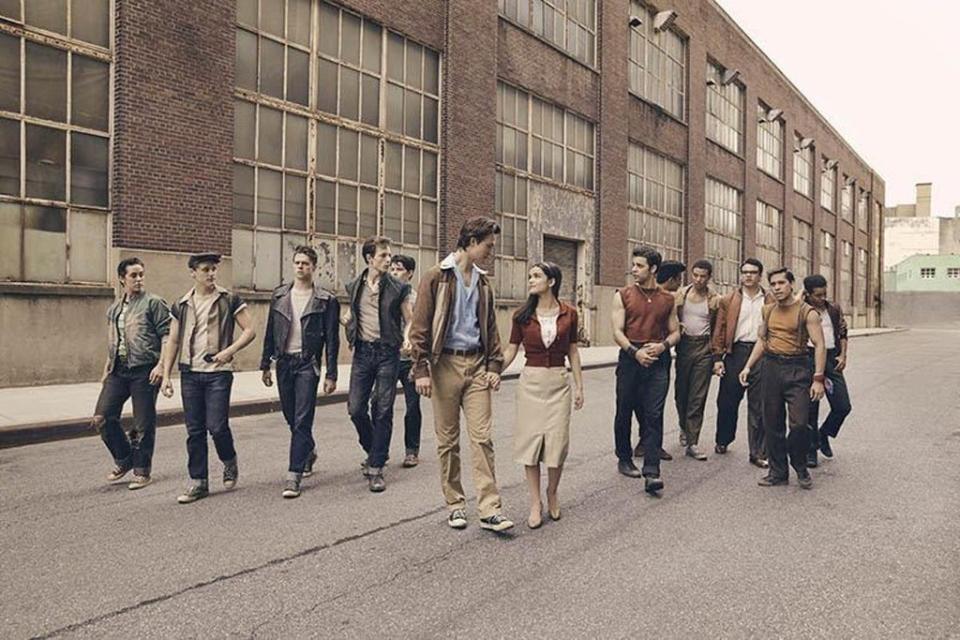West Side Story review: Spielberg’s version is far from a radical revisionist triumph

Dir: Steven Spielberg. Starring: Ansel Elgort, Ariana DeBose, David Alvarez, Mike Faist, Rita Moreno, Rachel Zegler. Cert 12A, 156 minutes
There’s a tragic irony at the centre of Steven Spielberg’s West Side Story. Until a week ago, I’d argue that there was very little point in such a pristine replica of a classic. And then we lost the man who could write about love so fluently that its entire, all-consuming nature could be captured in the simple phrase: “hold my hand and we’re halfway there”. Hold the words of Stephen Sondheim – clear, beautiful, and soaring – close to your chest, and you’re already halfway to understanding the depth of feeling West Side Story can provoke. Spielberg’s film is a final tribute to Sondheim’s work. If it achieves anything, let it remind us of exactly who the world lost when the composer died last Friday.
The musical, originally staged by Jerome Robbins in 1957 and adapted to film four years later, is a reconfigured take on Romeo and Juliet that recasts the Montagues and Capulets as two warring gangs in New York City – the white immigrant Jets and the Puerto Rican Sharks. Two star-crossed lovers, Tony and Maria, try to preserve something pure within all the unquenchable violence that surrounds them. But step away from those eternal matters of love and hope and the story that surrounds West Side Story gets increasingly complex. Spielberg’s adaptation, in turn, ends up colliding with an impossibly stacked burden of expectation.
For decades, Puerto Ricans have had to contend with it being one of the few times they were represented in mainstream culture, while being simultaneously reduced to violent, exoticised and marginalised stereotypes. Infamously, the 1961 film only featured one Puerto Rican star in its cast, Rita Moreno (who won the Oscar for her performance as Anita, Maria’s closest friend), while both she and the rest of the Sharks were made to artificially darken their skin with make-up. Any argument for the necessity of a new West Side Story inevitably stems from the desire to right these wrongs. And there is a form of justice to be found in how well Spielberg’s film functions as an instant star-maker for its Latin cast.
Rachel Zegler, in the role of Maria, closely replicates Natalie Wood’s own twinkling, saintly presence – quite the achievement for a debut performance. Anita has been given an expanded part in the narrative, fronted by Broadway’s own Ariana DeBose, who in turn seems to fill the entire film up with her kaleidoscopic emotions. DeBose delivers everything with precision, whether a word, a kick or a high note. Moreno herself returns as the reimagined character of the drugstore owner, now called Valentina. It’s largely so that she can deliver the number “Somewhere” as a way for the film to respectfully, and rightfully, lay flowers at her feet.
On the side of the Jets, the balance in talent certainly doesn’t come from Tony, played onscreen by Ansel Elgort. His presence in the film is already an uncomfortable one, following sexual allegations made against him last year (he’s denied them), but even if you were to judge Elgort’s performance in total isolation, his stilted monotone delivery still falls completely flat when pitched against a cast of energetic, highly expressive theatre professionals. Take Mike Faist as Riff, the Jets’ leader, who’s so thrillingly combustive you half expect him to simply burst into flames.
That said, anyone who goes into Spielberg’s West Side Story expecting radical revisionism will find exactly the same themes as before, only now repeated a little more forcefully. Its story was always about the assimilated, and poor children of white immigrants being turned against the recent Puerto Rican arrivals. But it now comes with the imagery of a pack of Jets defacing a mural of the Puerto Rican flag – just in case anyone at the back didn’t quite catch on.
The literalism of Tony Kushner’s script even creates new problems – the film’s climactic scene of attempted rape, now even more brutal than before, makes the decision of explicitly excusing white women from the culpability of what’s happening onscreen. For what reason? They have as much a part to play in upholding white supremacy. Tony, normally introduced as a peaceful soul, is given a violent backstory that tests the audience’s sympathy for him. Even the film’s strongest creative decision, to have the Latin characters shift authentically between Spanish and English as they speak, with the Spanish left unsubtitled, isn’t technically new – Lin-Manuel Miranda was hired to do exactly the same for a 2009 stage revival.

There was never any doubt that Spielberg would be able to direct a handsome looking musical. Justin Peck’s choreography recognises that there is no West Side Story without the finger snaps and balletic sweeps, but still finds its very own rhythm, captured by Spielberg’s camera with an elegant dynamism. The director’s go-to cinematographer, Janusz KamiÅski, once again uses light and shadow to stunning effect. Single shots and moments do, in fact, surpass what the 1961 film achieved – there’s one particularly gorgeous image of Riff’s face, shot just-so so that the light highlights a small scar on his cheekbone. Is this from some past, unseen act of violence? All those technical triumphs only complicate what feels like an unanswerable question: how can a film look this good, feel so moving, and still come up lacking?
Read More
A Boy Called Christmas review: A cynical Santa origin story delivered with surprising heart
Encanto review: Colombia-set musical adventure is one of the best Disney films of the modern era


